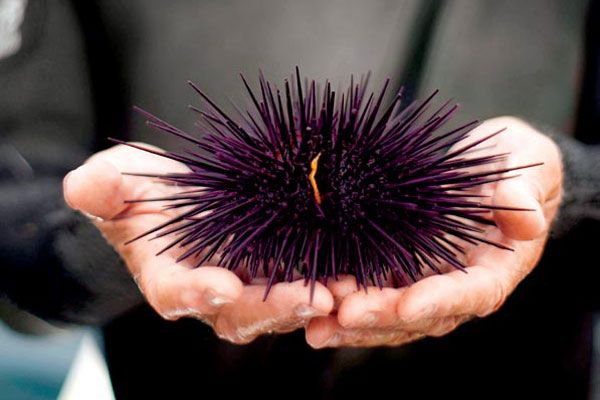
Tongue-like, nubby, bright orange uni, aka sea urchin roe, has gone from rarity to staple on many local menus, making appearances beyond the sushi counter in such dishes as pasta at 1760 (Nob Hill) and uni avocado toast at Bar Crudo (NoPa). As foodie love for urchin gonads (yes, you read that right) grows, attention is turning to the suppliers: a small but passionate free-diving community in the Bay Area. Braving chilly waters year-round to pluck the bristly sea animals out of their rocky anchorages from Mendocino to Santa Barbara, recreational divers are rewarded with an almost unlimited supply of sea urchins.
Harold Gibson, 36, a Hawaii native who’s been diving most of his life, wasn’t always the biggest fan. “Uni was one of the things I absolutely detested. By the time it was harvested and shipped to Hawaii, it tasted pretty nasty,” he explains. But when he moved to San Jose in 2001, he developed a taste for the delicacy. “I realized that when it’s good, it’s like ocean-flavored custard.” In Fort Bragg, where Gibson dives for uni regularly, it’s very good. And unlike abalone, sea urchin doesn’t suffer from problems with overfishing—its overabundance qualifies it as a pest.
“It’s never a question of availability,” Gibson says. “You can see hundreds on a dive.” This wealth of urchins has persisted despite an active commercial industry and a growing worldwide appetite for uni. Tom Trumper, of Pacific Rim Seafood in Fort Bragg, processes close to two million pounds per year, but notes there’s still no danger of depleting the region’s supply. “It’s practically impossible to overharvest urchins,” he says. Regularly harvesting them actually allows them to reproduce more—the animals spawn less when they’re allowed to grow large.
And demand keeps on growing. Trumper and his daughter also ran a dive shop, Fort Bragg Marine Dive & Kayak, but found themselves so swamped with uni requests—from the United States, China, and beyond—that they traded in retail for diving and processing full time. “The great thing about urchin diving is that you’re never throwing it back. You get to go down and pick each one individually,” Trumper says. “It’s the best kind of quality control.”
Local, sustainable, and delicious? Gonads never sounded so good.
Try it: Does your uni-love inspire you to slither into a wet suit and go diving for your dinner? Here’s how to get started.
This article was published in 7x7's May 2014 issue. Click here to subscribe.
Related Articles

